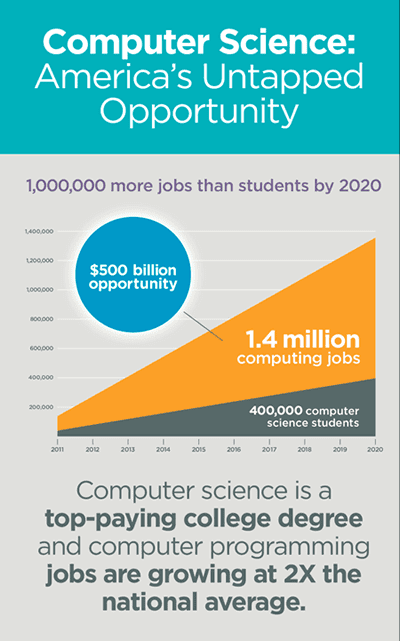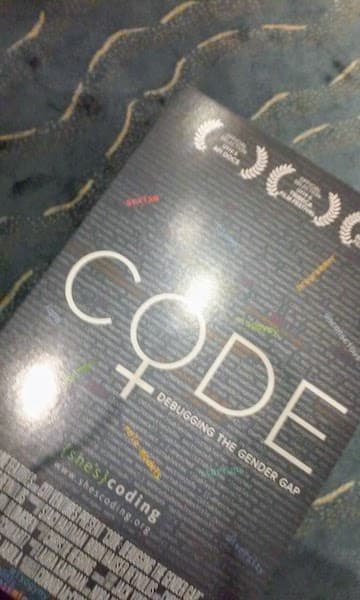Review of Code: Debugging the Gender Gap
There’s been enough coverage in the last year, that most folx accept tech has a diversity problem. The documentary Code: Debugging the Gender Gap looks at this issue1, it’s history, causes and impact.
While, honestly, I went into this documentary with the sense that it would be akin to preaching to the choir, I was pleasantly surprised at how many new things I learned. As a result, I feel the film can have an impact on a wide audience, and I hope it does when it expands beyond the festival circuit (it premiered in April at the Tribeca Film Festival and I saw it at the AFI documentary festival in DC).
The film covers women’s role in computer science history (think Ada Lovelace and Grace Hopper) and how the stereotype and expectation of the young, white and male computer science nerd eventually led to women leaving their studies and the field in the mid-1980s.
Director Robin Hauser Reynolds interviews people like Megan Smith, CTO of the United States, as well as engineers at companies like Spotify, Pinterest, Facebook, Twitter, and Pixar. Highlights include:
- Danielle Feinberg (@dafeinberg), director of photography at Pixar, who is so clearly enthused about her work, but realistic about what it means to be a woman in tech.
- Tracy Chou (@triketora), the Pinterest engineer who got companies to start sharing actual numbers about their diversity (read more).
- Roz Ho, the senior vice-president of engineering at Ericsson and a former Microsoft executive who relates how a majority male leadership team ignored focus group results that said Microsoft’s animated assistants — yes, I’m talking about Clippy — appeared to be leering at users and made female users uncomfortable.
In terms of addressing the sometimes toxic culture women face in tech, I felt the handling of the controversy around GitHub (backstory) was handled awkwardly (without knowing more, one might think men watching women hula hoop was why Julie Ann Horvath left the company) and I could have done with zero screen time for Pax Dickinson (backstory).
Something the film drove home for me, specifically, was the actual nuts and bolts of our pipeline problem, even aside from the issue of diversity. In terms of computer science education, we, as a nation, are woefully unprepared for the engineering jobs available. In an interview with the Washington Post, Reynolds summarized the issue:
By the year 2020, there are going to be 1 million unfilled computer engineering jobs in the U.S. We can’t fill the spots if we’re only filling from half of the population. It’s a great opportunity for women. We have all these jobs, and we need more people to fill them. It’s the same thing with people of color. There are jobs, let’s go!

For kids in school now, gearing up for those opportunities is not easy. In half of US states, computer science classes don’t count toward students’ graduation math and science requirements. And things are getting worse for CS at the high school level: Since 2005, introductory secondary school computer science courses have decreased in number — by 17 percent. This lack of exposure has an impact, as 98% of CS majors reported some exposure to CS prior to college (in the form of classes, camps, after-school programs, etc). 2
While some of this info was eye-opening and new to me, the overall themes of Code tie in to my personal motivations to get more women into tech/programming:
- the need for coders is great, therefore their compensation is also great (and, for women, PoC and economically disadvantaged folx, really potentially life changing)
- tech plays an ever-greater part of our lives, and it’s meaningful for women to be makers, not just users/consumers, of that tech
Overall, I would recommend the documentary to those interested in an overview about the issues women in tech face. I hope we have an opportunity to have a screening here in Baltimore for the women in tech and Girl Develop It communities.

As always, feel free to send comments to me via Twitter. (NB: As of 2025, I am no longer using Twitter.)
- The film, obviously, focuses on the lack of gender diversity in tech. Other diversity issues --- ethnic, socio-economic --- are discussed and some of the things that keep women out of tech --- lack of role models, toxic culture --- affect these other groups, too. ⤴
- Sources for CS education stats: https://code.org/stats, http://www.computinginthecore.org/facts-resources, http://www.exploringcs.org/resources/cs-statistics ⤴